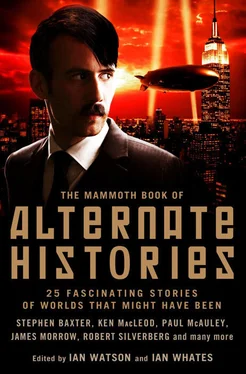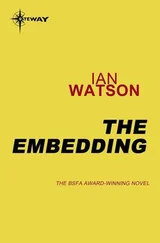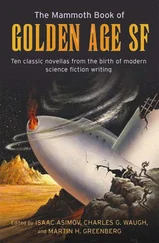I walked up Duncannon Street, avoiding eye contact with anyone in a plastic fake-leather jacket. The bank is still called the Royal Bank and the currency is still called the pound. Come to think of it, the Party is still called Labour. Zigzagging the Strand and Kingsway, I was 100 metres from Holborn when I noticed I was being followed. Usual stuff — corner of the eye, shop-window reflection, tail still there after I’d dashed across the four lanes (GBR traffic’s mercifully two-stroke, and sparse) and walked on. Worse, when I checked again in a parked wing-mirror the guy vanished in plain sight. (In my plain sight, that is. No one else noticed.)
Another sidewinder, then. One who knew I was on to him. Shit. Jack Straw’s boys (and girls) I could dodge with my eyes shut. This was different.
There’s a procedure for everything. For this situation, SOP is to take a long step sideways — chances are, the sidewinder who’s spotted you spotting him has just hopped into an adjacent probability (like, one where you took a different route) and is sprinting ahead to hop back further up the road (following his SOP, natch). But he’d know that, so if he knew I was a sidewinder… but I had no evidence of that, yet. Either way, the trick was to take a bigger or a smaller jump than he’d expect, but one that would still keep me on track to catch an Edinburgh train at King’s Cross.
I turned sharp left onto High Holborn and walked briskly towards the border. Long before I’d reached Princes Circus, I was the only person on the street. There isn’t a wall between East and West London — they’ve learned that much — but planning blight, student hostels and regular patrols fill the function almost as well. From a sidewinder’s angle, though, the good thing about the band of run-down property east of Charing Cross Road is that it’s a debatable land, a place where the probabilities are manifold, and therefore a prime locale for long sideways steps.
I clambered over concrete rubble, waded through fireweed, crunched broken panes, and stood still and did that thing in my head.
You do it too.
Those times when you know you left the front-door keys on the kitchen table, not beside the phone, and there’s no one else around who could have moved them? Big secret: it wasn’t the little people messing with your head. That street entrance or shop front you’ve never noticed before, though you must have driven past it a hundred times? Shock revelation: you’re not living The Truman Show , and nobody’s shifting the scenery.
You’re, shifting, in the scenery: sideslipping between entire universes whose only difference may be where you left the keys last night, or how a town plan turned out thirty years ago, or a planning permission last month, or.
You’re doing it all the time, unconsciously. Sidewinders do it consciously. Don’t ask me how, or how many of us there are. You don’t want to know. Most of us, by a sort of natural selection, end up in the probability where they’re happy, or at least content. A small minority are intrinsically malcontent, or seduced by the possibilities, or both.
Some of that minority get recruited. You don’t want to know about that, either. Let’s just say there are two sides. Well, there are an infinity of sides, but they collapse, on inspection, to two: the Improvers, and the Conservers.
The Improvers want to put “wrong” histories “back on track”; the Conservers want all possible histories to unfold unhindered. This conflict has, I’m told, been going on for some time. I suspect it’s waged from great shining bastions of widely separated probability where civilization is vastly more advanced than it is anywhere we can reach, each of them perhaps far outside the human branch of history altogether. The best-laid plans of Miocene men, or of the wily descendants of dinosaurs on an Earth the asteroid missed.
That’s the sort of question we sidewinders argue amongst ourselves. For you, for now — all you need to know is, I’m an Improver.
And right now I was on the run from a Conserver.
3. Tairlidhe is my darlin’, the young chevalier
I stepped out of the bank doorway I found myself in, nodded to the footman, and caught a tram. Tall buildings, fat with sandstone and gross with gilt, filled the view from the top-deck window. The streets buzzed with electric velocipedes and reeked with ethanol-fuelled cars. The pavements were more crowded than those of the world I’d come from, and the crowds whiter. Here and there a Mahometan, a Hindoo or a Jew walked, distinct in their costume and dignity. Blacks and Chinese were more common and less noticeable, porters and street-merchants for the most part. Slavery was abolished in 1836, after the Virginia Insurrection made it too expensive; the Opium Wars were never fought.
Discreetly, I unscrewed a boot-heel and thumb-nailed out a 1997 shilling with the head of Charles X. The conductor grumbled, but gave me a fistful of nickel in change that weighed down my jacket pocket as I jumped off. King’s Cross is in the same place, with the same name — it’s one of those sites that’s a converse to the debatable lands: a place implacable, straddling probabilities like railway lines. The statue in the front is of Luipoldt II.
I plunged to the ticket office through the foetid cloud of pomade and pipe-smoke and bought a single to Edinburgh. Display-boards clattered with flip-plates of digits and destinations. An express at twelve of the clock, platform three. I bought a newspaper and a packed lunch, and took my seat. The train — French-fangled, electric — glided out as all the church-bells of London pealed noon, flashed through the villages north of London — Camden, Islington, Newington — at an accelerating clip that reached 150 miles an hour as we passed Barnet. Too fast to read the sign, but I knew the town. There’s always, for me, a frisson at Barnet — it’s where the last battle of the Second Restoration was fought, when the Bonny Prince and his men routed the Hornsey militia and found London defenceless before them.
The endless fields of England rolled by, the spring ploughing well under way, sometimes with one man behind a horse, sometimes with a great modern contraption from the Massey manufactories, drawn by a phalanx of Clydesdales. I leaned on the table, munched bread and cheese and sipped stout, and worried idly about my soft spot for this probability. How does one weigh the absence of total war and totalitarian revolution, against the continuance of Caliph and Romanoff and Manchu, and Voltaire at Ferney broken on the wheel?
I was in the non-smoking carriage, with the ladies, which didn’t bother me at all. My clothes, while unfashionable, raised no more than a momentary eyebrow. A bum-freezer here is a pea-jacket there, and Levi makes denim jeans across a surprising range of probabilities.
Across the table — not Pullman, but the idea is obvious enough — sat a young lady, bowed over a thick book. Black brows knitted under her bonnet, lips moving as she read, her thin face pallid, her gown frayed at the cuffs. She glanced up as I turned a rustling page of The Times, and I smiled politely and looked back at the science page. Antarctic continent found — Spanish claim disputed. The young woman sighed. I looked up again.
“A heroine in jeopardy, milady?” I asked.
She shot me an indignant glance.
“I am not reading a novel,” she said. “I study zoology.”
“Ah,” I said. “Your pardon. An admirable pursuit.”
“But it is so hard!” she cried. “All those lists!”
“The Latin names,” I murmured, nodding sagely, “of the great Linnaeus? They can indeed be a trial — “
Читать дальше












